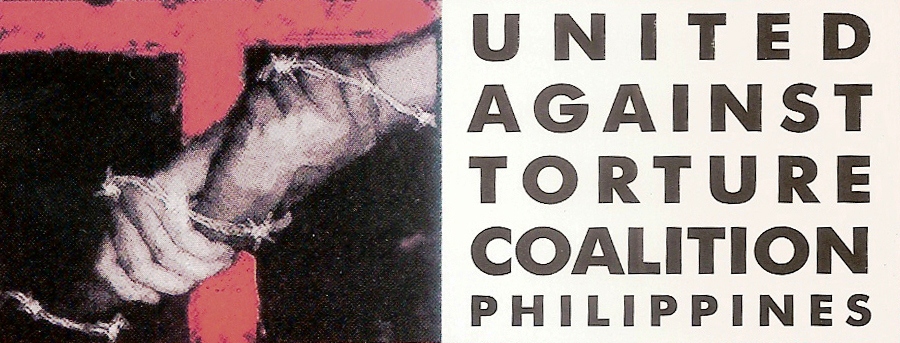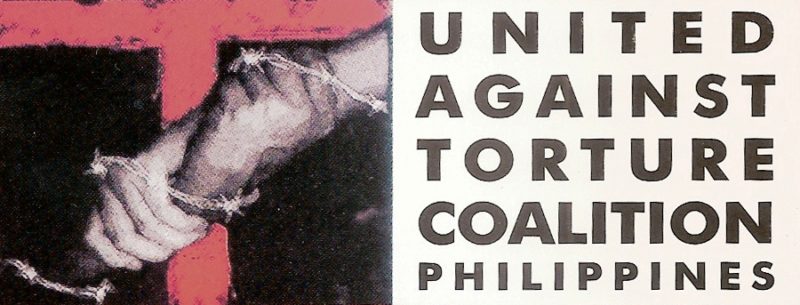
UATC Support Statement on
Amnesty International’s Global Campaign Against Torture
13 May 2014
Empowering the Torture Victims is a key in Fighting Impunity
Torture is an affront to human life and dignity that cannot be justified under any circumstances in any parts of the world.
The United Against Torture Coalition – Philippines (UATC) restates its commitments to fight against torture and end impunity by upholding the basic human rights and dignity of every individual as it joins the Amnesty International in the launching of the Global Campaign Against Torture.
The global campaign, which will be carried out through holding of series of public events, is aimed to remind all States including the Philippine government of their obligations to respect and guarantee the right of every person to be free from torture and ill-treatment, to effectively bring those responsible to justice, and to guarantee reparative measures to victims and their families.
The UATC- Philippines laments that the practice of torture continue to occur in a widespread and systematic manner everywhere in the world. The Philippines is no exemption. Despite the enactment a domestic law criminalizing torture in 2009 which is purportedly aimed at ending impunity and giving meaning to the Convention Against Torture to which the Philippines is state party since June 1986, torture is continuously being committed by government authorities or agents of the state particularly the police and the military usually to punish, to obtain information or a confession, to take revenge on a person or persons, and to sow terror and fear not only to victims but also to their families and the larger society.
The clear rift between policies and practices of torture in the Philippines is once again conspicuously displayed in the recent news about existence of the “wheel of torture” at the Philippine National Police (PNP) satellite detention facility in Biñan, Laguna.
It reveals not only that torture is still prevalent, but it is being committed with total impunity. The Philippine Justice system seems to be unmoved by these legal and institutional reforms as no perpetrators until now are held to account.
Take for example the documented torture cases of Lenin Salas, Ronnel Victor R. Cabais and Abdul-Khan Ajid which are faced with a number of legal impediments such as the slow and ineffective police investigations, difficulty in positively identifying the perpetrators, inaccessibility of prompt, thorough, impartial and independent medical care and evaluation and the risk of reprisals against victims and witnesses.
While it is imperative for the Philippine government to address the existing legal gaps and limitations in the implementation of the law in order to ensure accountability, it also needs to focus its attentions and efforts on the prevention of torture and the rehabilitation of torture victims.
One way to ensure its prevention is to guarantee and strictly observed the rights of any person under arrest or placed under custody particularly the right to medical examination within 48 hours and in every level of the chain of custody.
Torture victims should also be accorded with immediate medical and psychological care through high quality, accessible and appropriate rehabilitation program regardless of the prosecution and conviction of the torture cases. Though, the Philippine government has just approved a Comprehensive Rehabilitation Programs for Torture Victims which was crafted by inter-agencies headed by the Commission of Human Rights (CHR), it is still very unclear how torture victims can access the available government services and if it has the necessary budget lines to ensure the provisions of rehabilitation program to torture victims. The Philippine government must therefore look at rehabilitation as the means to empower the torture victims in order for them to resume a full life as possible and to restore their situation in all likeliness that it would have existed if torture had not been committed.
The UATC – Philippines believes that empowering torture victims is a key not only for rebuilding their lives but also for continuing their quest for justice. However, this can only be possible if the Philippine government and all states can guarantee the freedom of every person from torture and other forms of state violence.
The UATC- Philippines is composed of more than thirty (30) human rights organizations led by Amnesty International-Philippines, Balay Rehabilitation Center, Families of Victims of Involuntary Disappearance (FIND), Medical Action Group (MAG), and Task Force Detainees of the Philippines (TFDP).

